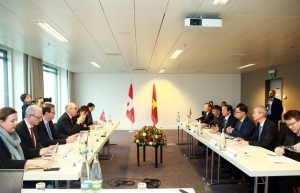Deeper synergies possible within Swiss trade relations
This is your first visit to Vietnam in this role. How do you evaluate the potential of cooperation between Vietnam and Switzerland in trading and agriculture?
 |
| Christian Hofer, director-general for the Federal Office of Agriculture from Switzerland |
I think there is enormous potential. Both countries are committed to sustainable production and consumption and they are interested in supporting in the world’s transformation of the food system. In our nations, it is possible to create products now, but also for the next generation while protecting the environment and to having welfare on the farming side.
Switzerland is maybe a small market in terms of consumers, but we have consumers that want to buy products with a high value. And in Vietnam, the country produces products for export that are also vital for Switzerland, for example, coffee, and cashew nuts. These products are important for Switzerland.
If we have the same philosophy that if you have a sustainable production of a high-value of product, you have the market in Switzerland, you find the market to sell it and on the other hand, you also have a market with 100 million consumers. And if we collaborate and have trade, then we can profit from each other. So Switzerland and Vietnam are very close to each other in their philosophy.
The investment capital inflow in the agricultural sector is modest. What is your proposal to improve this situation, especially attracting capital from EU investors?
Vietnam is already attractive to Swiss investors. In reality, numerous Swiss companies are investing in the country, including big companies such as Nestlé. And important for the investors is the stability of the economy that when they come to Vietnam. They invest not only for today or tomorrow – they have a long-term strategy, and if Vietnam can give them trust if they invest, it’s also an investment for the long term.
One key aspect is the support from the government in producing high-quality products. We try to support the whole value chain to succeed in the high criteria of quality. It could be organic farming or it could be auto-labels, to really reach the criteria that you can use to succeed in the markets in Switzerland or in Europe as a whole.
Another important thing is when companies are investing in Vietnam, their products have also a perspective in the world market and we can collaborate with the government to support the know-how of the companies.
Switzerland has well-developed agriculture, so how can Vietnam learn the lessons and experience from your country?
Maybe first of all, it’s learning from each other. So when we are here, like our visit to Son Ha Spice and Flavorings, we learn from them. We saw the experience and the working spirit. And perhaps Vietnam can learn something from us.
For 30 years, Switzerland has tried to motivate farmers to produce in a sustainable way. There, it’s crucial that you can connect the farmers with the market so that they can profit from that market with high-quality products. We put some incentives to the farmers that they produce in an organic way. Some years ago, our political system supported the farmers to produce only in a high amount, with high yield. And now the government gives incentives to farmers that are not only producing a high amount, but a high quality. That is something to think about, certainly.
Another thing is that, in the end, it’s always the consumer who is deciding what he is buying and he also decides a little bit at the end what the farm is producing. Vietnam should not only should look at the farming side, but should also educate consumers to make it transparent. You can communicate with consumers and if you can connect them, they may want to buy more sustainable products from the farmers that produce for the market.
Vietnam and the four EFTA nations (Iceland, Liechtenstein, Norway, and Switzerland) have been looking at a free trade agreement, but negotiations are taking some time. What is Switzerland doing to accelerate the talks?
On both sides we should take the chance to develop this negotiation and to look if we can really find a solution with a trade agreement. I’ve seen first-hand that the Vietnamese and Swiss markets could work concurrently with each other; we’re not in a competition.
So, Vietnam offers products we don’t have in Switzerland, we can use them, and they offer more diversity in the products available in Switzerland. And on the other hand, we have some products, like cheese, for the Vietnamese market. With these types of exchange, it’s a synergy and a win-win situation. That’s why both parties should be interested in taking that chance and developing the discussion to finalise an agreement.
 | Switzerland supports Vietnam in enhancing trade policy and export promotion Switzerland and Vietnam signed an agreement on the implementation of the Trade Policy and Export Promotion (SwissTrade) project on October 22 to improve trade performance and international competitiveness of small- and medium-sized enterprises by enhancing the framework conditions for trade, improving public-private dialogue mechanisms, and strengthening the eco-system for trade promotion. |
 | Switzerland sees downside as FTA not yet reached The entry into force of the EU-Vietnam free trade agreement (FTA) has put Swiss exporters at a competitive disadvantage over their main EU competitors, spokesman for Switzerland’s State Secretariat for Economic Affairs (SECO) Fabian Maienfisch told Thuc Minh. |
What the stars mean:
★ Poor ★ ★ Promising ★★★ Good ★★★★ Very good ★★★★★ Exceptional
 Tag:
Tag:
Related Contents
Latest News
More News
- Businesses bouncing back after turbulent year (February 27, 2026 | 16:42)
- PM outlines new tasks for healthcare sector (February 25, 2026 | 16:00)
- Ho Chi Minh City launches plan for innovation and digital transformation (February 25, 2026 | 09:00)
- Vietnam sets ambitious dairy growth targets (February 24, 2026 | 18:00)
- Masan Consumer names new deputy CEO to drive foods and beverages growth (February 23, 2026 | 20:52)
- Myriad risks ahead, but ones Vietnam can confront (February 20, 2026 | 15:02)
- Vietnam making the leap into AI and semiconductors (February 20, 2026 | 09:37)
- Funding must be activated for semiconductor success (February 20, 2026 | 09:20)
- Resilience as new benchmark for smarter infrastructure (February 19, 2026 | 20:35)
- A golden time to shine within ASEAN (February 19, 2026 | 20:22)



















 Mobile Version
Mobile Version